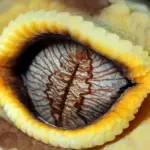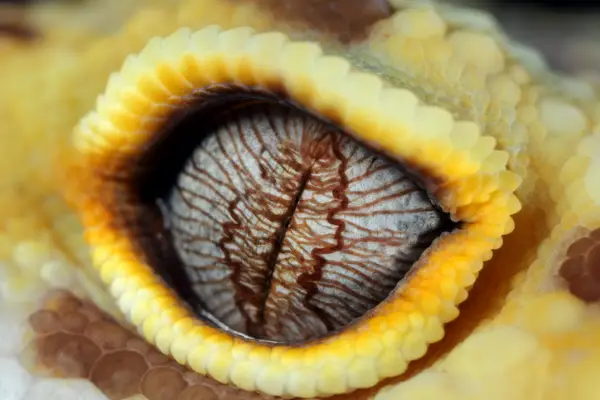Leopard geckos, with their large, adorable eyes, are prone to eye ailments. Mostly, these problems are due to either environmental factors or poor husbandry. Many leopard gecko owners often wonder if their lizard can see at all.
So, how do you tell if a leopard gecko is blind? There are simple ways in which you can test if your leopard gecko is blind, such as flashing a light past its eyes, moving your hand past its face or seeing how it reacts to live prey. If you believe with certainty that your leo suffering with eye issues you should visit a local vet.
Why do leopard geckos go blind?
Leopard geckos have amazing eyesight, which allows them to stay hidden away from predators and hunt their prey in the dark. However, if they’re not looked after really carefully, they might develop problems that could lead to blindness. Some problems that lead to blindness in leopard geckos are:
- Vitamin deficiencies
- Shedding issues
- Eye infections
In the majority of cases, leopard gecko blindness is entirely preventable.
Your leopard gecko’s enclosure
For optimal health, including eye health, your pet’s enclosure needs to be maintained and cleaned regularly. Urine and faeces accumulate in the substrate, which increases bacterial growth that can be harmful to leopard geckos’ eyes if they are exposed to it regularly.
To ensure the enclosure is in optimal condition, you should clean it at least once per month. A leopard gecko is pretty good at keeping its enclosure clean but it can’t rid its enclosure of faecal matter and urates. Get a good enclosure in the first place.
What should a full enclosure clean involve?
Cleaning your leopard gecko’s enclosure should involve removing and replacing the substrate, cleaning all of the tank equipment, and wiping down the tank walls. You should ensure you use a suitable cleaner that gets rid of harmful bacteria.
What about shedding?
You need to ensure that the enclosure has a humidity level between 20% and 40% so that your moist hide stays moist. If the humidity level isn’t high enough, leopard geckos can have serious issues with shedding, which can lead to blindness if it gets stuck around the eyes. Make sure to use a good humidity meter.
For more information have a read of my guide to leopard gecko shedding.

How do you tell if a leopard gecko is blind? This is how you can tell.
Essential nutrients to prevent blindness
You should ensure that your leopard gecko has a nutrient-rich diet and is supplemented with appropriate vitamins. These play a vital role in the health maintenance of your pet and without these, your leopard gecko can develop eye issues.
It is important to know what the perfect diet for a leopard gecko consists of. Take a look at my leopard gecko feeding guide to learn more.
The signs that your leopard gecko may be blind
It’s essential that you know the signs of eye problems in your leopard gecko. In the wild, leopard geckos’ eyesight is the most useful of their senses for staying alive. Often, it’s difficult to detect whether your leopard gecko is blind or not as sometimes they can be unresponsive and act as though they can’t see when, in fact, they can. However, there are certain obvious eye problems that you should look out for.
Foreign Bodies
When your leopard gecko has something in his eye – some bedding, gravel, food, or retained skin, for example – it can get lodged or stuck in the socket and can cause problems if this is not removed swiftly.
Abscesses
If there is a foreign object in the eye or if the leopard gecko has an eye injury, he might get an abscess or develop an infection. It’s more common for the eye underneath the eye to swell. You can identify abscesses by noticeable lumps that appear suddenly.
Abscesses can be caused by mealworm or cricket bites or from scratches and injuries from objects in the enclosure. You can feed them canned mealworms. If your leopard gecko has a tank mate and they fight, he could develop an abscess if he has a wound caused by fighting.
Ulcers of the eye
When the eye suffers trauma, it can develop an ulcer. This is when the eye’s clear coating (the cornea) gets damaged. These can be large or small, but they are really painful. When a leopard gecko has an ulcer on his eye, he might try to use his tongue to clean it, scratch at it, or keep the eye closed.
Conjunctivitis
Bacterial conjunctivitis happens a lot with leopard geckos. They can get this from a dirty environment or dirty water. One of the main reasons for them getting conjunctivitis is a dirty enclosure.
Eyelid lining retention
When your leopard gecko has shed, you need to check that its eyelid lining hasn’t been retained. If there is not enough humidity in the enclosure, the eyelid lining can be retained and this can develop into an infection.
Proptosis
This is arguably the worst problem for a leopard gecko’s eyes, but it’s also very rare. This condition is when the eye comes out of its socket but it only happens if your pet is squeezed really hard.
How to test if your leopard gecko is blind
If you want to check your leopard gecko’s vision, there are things you can do to test their eyes.
- Shine lights across your pet’s eyes in a darkened space – you should notice their pupils constricting or they might squint. If your leopard gecko is blind, he won’t react at all.
- Wave a hand in front of his line of vision – if his head follows your hand, you will know he can see it. If he doesn’t react, it’s not a sure sign he is blind, but it could be an indicator.
- See how he reacts to you putting crickets in his enclosure – sometimes leopard geckos can be lazy hunters but the majority of them will try to catch the crickets. You can feed them canned crickets instead. If he doesn’t notice their presence, your leopard gecko could be blind or partially blind.
If your leopard gecko is blind
You might notice your pet stumble around or struggle to find things. While it might make you sad if your pet is blind, they’re pretty good at adapting to it. When it comes to eating, a blind gecko will need help to eat, especially fast insects like locusts and crickets. You might need to be more patient with them. You can give them already dead crickets so they can take them easy.
These lizards do rely heavily on being able to see, especially in the wild. But since your pet is in an enclosure, they’re much more likely to be happy with their condition.
Conclusion – how to tell if your leopard gecko is blind
Sometimes a leopard gecko may be blind for a congenital reason (like albino leopard geckos) but sometimes it happens because of trauma or illness. It’s generally not a problem if your leopard gecko is blind; he will be happy and enjoy life with just a little bit of patience and help to eat.
As there are lots of reasons why your leopard gecko might become blind, it’s important to be aware of the causes and signs of blindness.
Ensuring that you keep their enclosure clean is one of the best things you can do like a lot of infections that cause blindness to occur because of a build-up of bacteria in the substrate.
If you suspect your leopard gecko has limited vision or is blind, you should perform the activities listed in this article. Then, if you still have concerns, you should ensure he is seen by a specialist vet who deals with exotic pets.
